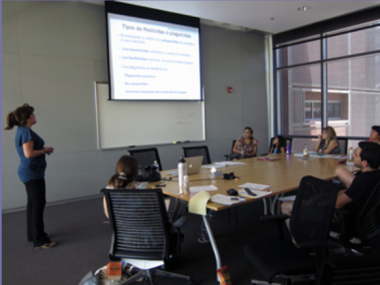Tips on Presenting
It is important to be comfortable with the material(s) that you will be presenting, but you do not have to be an expert. Remember to rehearse the presentation in order to feel confident. Prepare to the best of your ability (at least a week or more in advance) and remember if you cannot answer a question there is no harm in saying, “I do not know the answer, but if you give me your contact information I can provide you with the answer.” Even the experts do this; don’t pressure yourself to know everything since it is simply impossible.
Be sure to layout the expectations that you have as a trainer from the beginning. This will help the participants know what to expect and how to conduct themselves during the training. Make the learning environment comfortable and nurturing for everyone.
Be able to adapt to the diverse learning styles. If you find it difficult to get a point or concept across, you may want to ask the training participants to help you. If not, try different techniques.
Adults have been shown to learn best when they are actively engaged in the learning processes. Therefore it is important to involve them in the training and listen to their experiences on the topic. This will help them become more comfortable and more interested.
- Face the trainees and have eye contact with all of them, not just a selected few.
- Avoid distracting behaviors (e.g. looking at your notes at length or playing with your hair).
- Dress appropriately and professionally according to the situation.
- Observe body language of the training participants for clues on what they are feeling (e.g. bored, hungry, angry, interested).
- When a participant is talking, look at them and listen, do not turn your back on them.
- Ask open-ended questions and respond positively no matter if they are right or wrong.
- Make sure to paraphrase a question or comment received by a participant so the others hear what was said and you truly understand what they are saying.
- Engage the participants when comments or questions come up since they can be helpful adding to the response or adding their experiences on the topic.
- Rest up and eat well before the training
- Use humor and avoid jargon during training.


